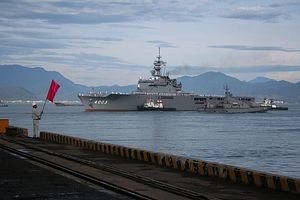Last week, Japanese Defense Minister Tomomi Inada unveiled a new defense initiative for ASEAN following her meetings with Southeast Asian nations in the Lao capital of Vientiane.
During the second ASEAN-Japan Defense Ministers’ Informal Meeting, Inada announced the “Vientiane Vision,” where Japan would seek to advance defense cooperation with ASEAN states more comprehensively through cooperation, support, and assistance, focused in particular on promoting the rule of law and strengthening maritime security.
“The Vientiane Vision is the first official document ever to indicate a comprehensive and transparent picture of Japan’s defense cooperation with the entire ASEAN region,” a Japanese government source familiar with the initiative told The Diplomat on Wednesday in response to an inquiry.
Japan already has longstanding relationships with Southeast Asian states and with ASEAN as a whole as one of the subregion’s oldest and most important dialogue partners. Relations began warming as early as 1977, when then Prime Minister Takeo Fukuda decided upon his election to improve Tokyo’s image in the region, which was marred by Japanese occupation during World War II. Since then, Japan has played an increasingly prominent role in Southeast Asia through its economic assistance, businesses, culture, and capacity-building in realms ranging from humanitarian assistance and disaster relief (HADR) to maritime security.
But ties have also been advanced further under Prime Minister Shinzo Abe since his return to office in December 2012. Part of this was due to the converging interests between the two sides, including new opportunities for Japanese businesses in Southeast Asia, concerns about China’s rising assertiveness in the East China Sea and South China Sea, and common challenges in fields like cybersecurity. During his first year in office, which happened to coincide with the 40th anniversary of ASEAN-Japan relations, Abe visited all ten ASEAN countries, while other senior government officials also made frequent visits to the subregion.
This charm offensive also saw a deepening of defense relations with Southeast Asian states as well as ASEAN as a whole. Much of this happened as broader partnerships were inked or upgraded with Southeast Asian states, as in the case of the Philippines, Vietnam, Malaysia, Indonesia, and Thailand, matching similar advances with other Japanese allies and partners including the United States, Australia, and India. But this was also catalyzed by changes in Japanese defense policy back home, with the overturning of a ban on arms exports in April 2014 paving the way for defense equipment and technology cooperation and transfers. This surge in ASEAN-Japan defense ties was the impetus for the convening of the inaugural ASEAN-Japan Defense Ministers’ Informal Meeting back in December 2014, which added to the Japan-ASEAN Defense Vice-Ministerial Forum.
Though it is still very much in the works, the Vientiane Vision appears to be yet another effort by Japan to further deepen its defense ties with ASEAN as a bloc. As laid out thus far, it appears to be less about specific areas of cooperation, whether existing or new, and more about setting out a comprehensive direction for ASEAN-Japan defense cooperation based on both general objectives as well as priority fields. The focus, the Japanese government source told The Diplomat, is to “promote practical defense cooperation” by combining various areas of ongoing collaboration.
Inada herself said at a press conference at Japan’s defense ministry (MoD) that it is more useful to think about it as an effort to “transparently illustrate the full picture” of defense cooperation with Southeast Asian states. She added that the Vientiane Vision would focus in particular on promoting the rule of law and strengthening maritime security. Pressed for specific ways in which cooperation would be advanced, she said there would be a whole spectrum including seminars on international law; capacity-building assistance; defense equipment and technology cooperation; training and exercises; and human resource development and academic exchanges.
She also stressed that this would be based on what Southeast Asian states felt was important, lest it be misinterpreted as a Japanese attempt to impose its own priorities on ASEAN countries. Based on her discussions with ASEAN states, including in Vientiane, Inada said some of the areas mentioned included maritime law and cybersecurity, and capacity-building assistance related to the disposal of landmines and unexploded ordnance. The fields that she stated attest to the diversity of needs across ASEAN, from the Philippines, one of Asia’s weakest militaries which continues to need maritime security assistance, to landlocked Laos, which is still dealing with legacy issues from the Vietnam War.
At this stage, the Vientiane Vision still appears to be a work in progress. The Diplomat understands that Japan intends to follow up with ASEAN countries on the vision statement through vice-ministerial meetings as well as an internal preparatory committee headed by the state minister of defense. It could be a while before details are worked out and more meat is put on the bones of the initiative.
But in laying out the initiative so far, Japan appears to have sent the right signals. The comprehensive focus of the Vientiane Vision outlined as of now, as opposed to a narrow one that addresses just maritime security, will ease the suspicions of some that this is an initiative aimed at China or the South China Sea rather than ASEAN as a whole. And the “bottom-up” feel that Inada has created, with an emphasis on listening to Southeast Asian needs instead of just imposing a canned vision, if sustained, is an effective way of winning countries over. For a subregion that has seen far too many cases of big powers doing too much talking at it, a little listening goes a long way, especially in an area of cooperation that is newer and in some cases more sensitive.
































